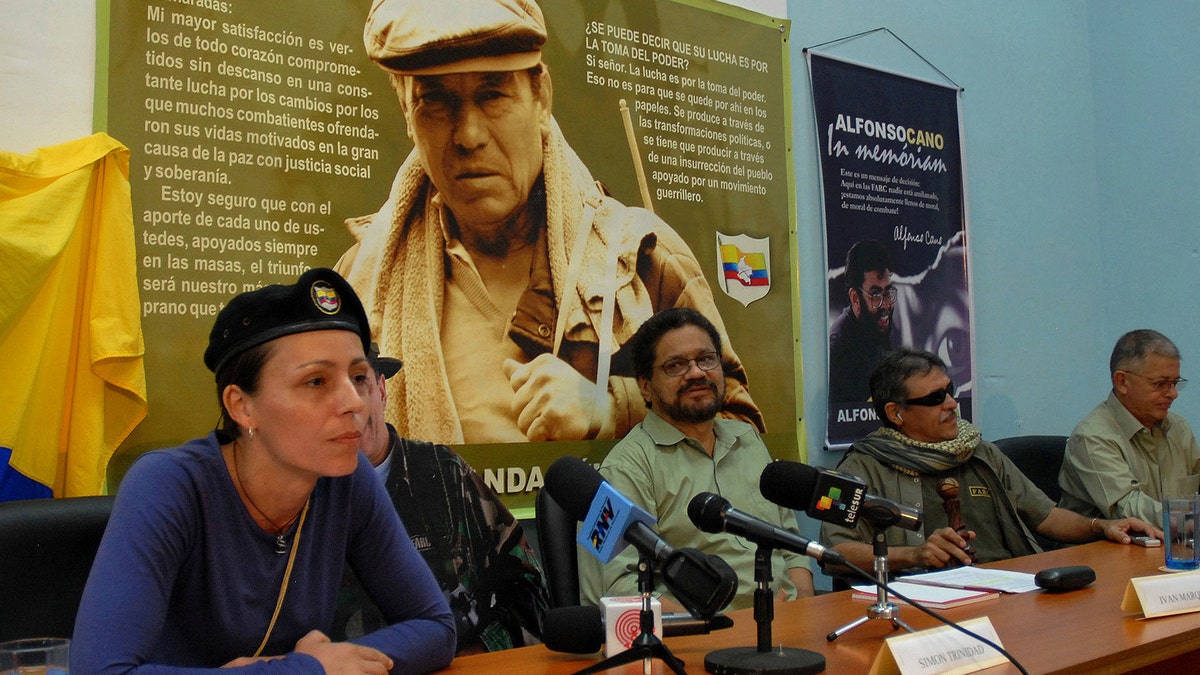
Dutch rebel Tanja Nijmeijer from FARC speaks with fellow member of the negotiating team Iván Márquez, center right, and Jesus Santrich,second from right, in Havana, Cuba. (ap)
The German-Prussian military theorist Carl von Clausewitz wrote, “War is the continuation of politics by other means.” Conversely, when a war draws to a stalemate, yet the parties are still standing, it is quite possible that politics is the continuation of war by other means.
As Colombia considers a peace treaty to end the insurgency of the Revolutionary Armed Forces of Colombia (or FARC), it should concern itself by the prospect that the guerrillas might achieve at the negotiating table what they failed to obtain in 50-plus years of murder, kidnapping, assassination, sabotage and seemingly endless bloodshed.
Still wedded to Marxist rhetoric, today’s FARC runs one of the most sophisticated, and lucrative, drug producing and distribution networks in the world.
Last time a Colombia government negotiated with the FARC the world’s oldest guerrilla insurgency ended up in control of a territory the size of Switzerland. Granted, at the time the FARC had over 15,000 armed soldiers and effectively ruled vast areas of the Colombian countryside.
The result of the negotiation was to allow the FARC to build bases, prison camps for their hostages, airstrips and training facilities. Still wedded to Marxist rhetoric, today’s FARC runs one of the most sophisticated, and lucrative, drug producing and distribution networks in the world. FARC’s cocaine operations are said to be worth billions. A virtual state within a state, the FARC has seen Colombian presidents come and go.
From 2002 to 2010, however, the government of President Alvaro Uribe increased its anti-FARC operations taking the fight to the guerrillas and denying them quarter. The result was to curtail the FARC’s drug operations, disrupt their financial networks, destroy rearguard bases and decapitate its leadership core through a series of dramatic pinpoint attacks. After two terms, the Uribe government and his successor, then defense minister Juan Manuel Santos, had the FARC on the ropes.
When Santos came into office, most analysts expected him to apply the finishing touches to the FARC. Instead, bloodied and partially decimated, the FARC put out feelers for negotiations. Santos, much to the dismay of Uribe and his supporters, held out an olive branch to the guerrillas and initiated talks in Havana, the center of the guerrillas’ political-diplomatic operations. Running for a second term, Santos has pledged to end the civil war.
In part, Santos seeks to open Colombian mineral excavation to foreign investments, yet FARC’s ability to harass and otherwise destabilize mining areas and blow up oil pipelines, has made this a highly risky proposition. The guerrillas, with less than 6,000 troops, still possess sufficient firepower to be dangerous, despite the Colombian armed forces superior capabilities.
During the negotiations, the FARC has laid out two primary and overarching objectives. First and most importantly, seeking to avoid irrelevance, the FARC wants to insert itself into the Colombian political process. The guerrillas want political and constitutional guarantees, out of proportion to any electoral support they might gain, in order to play a role in shaping Colombia’s future. FARC leaders want amnesty for themselves and a seat at decision-making councils. So far, one point of agreement at the current talks calls for temporary special congressional districts where the FARC are strongest.
In this they have the support of Venezuela’s socialist government, a sponsor of the negotiations, which has long sought to undermine the power of its economically and militarily superior and U.S.-allied neighbor. For Venezuela’s leaders the FARC is the Trojan horse inside Colombia’s gates.
Second, the FARC has long sought to seize land through government-approved redistribution schemes. Redistribution would simply provide legal status to much of the land currently under FARC control. The negotiations have also yielded agreement to tackle deep poverty in the countryside.
Santos hopes to have the negotiations completed and a treaty put to the nation as a referendum during legislative or presidential elections next year. Meanwhile, a FARC plot to murder former president Uribe and the attorney general among others was discovered on November 12th. This has hardened Uribe’s already harsh criticism of the negotiations with a group he’s described as “little saints” the government wants to turn into a political party. This recent revelation has led analysts to conclude that the FARC is far from renouncing the means of war to achieve its political objectives.
